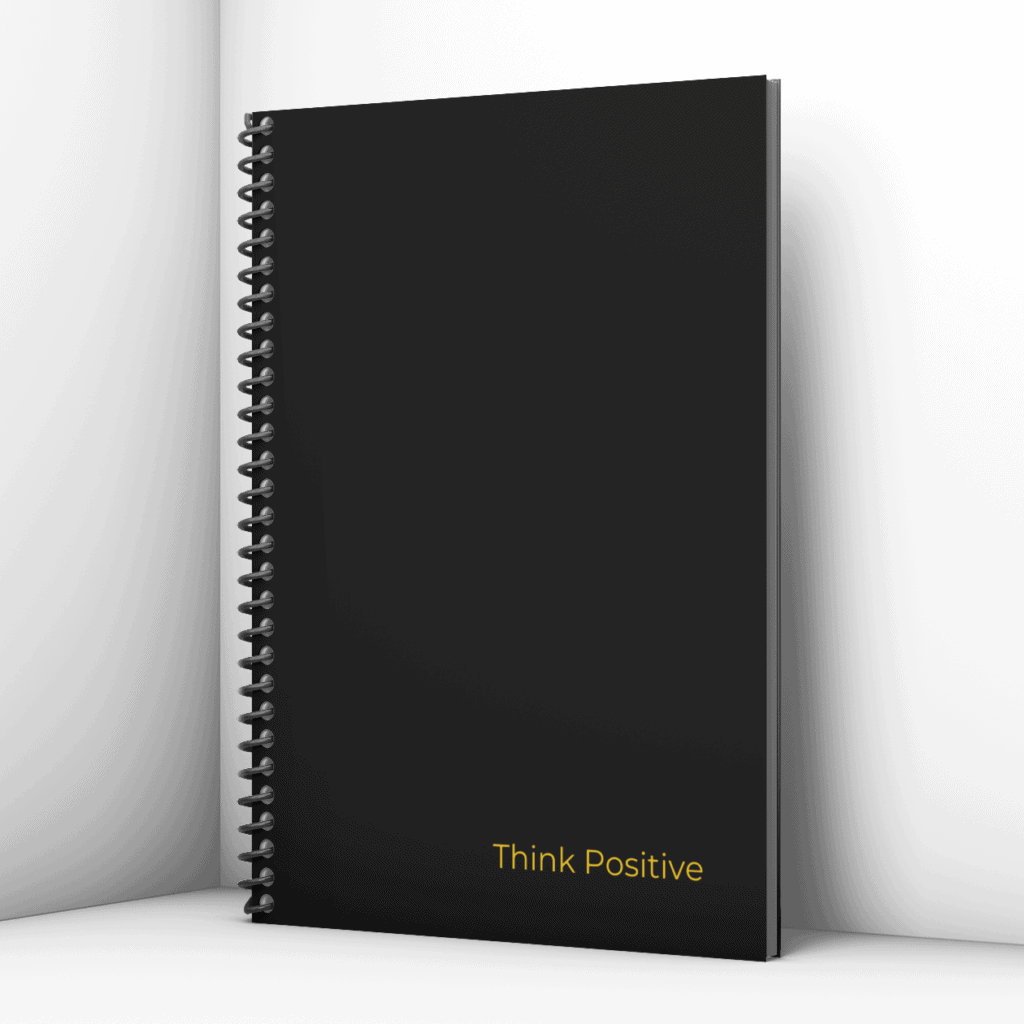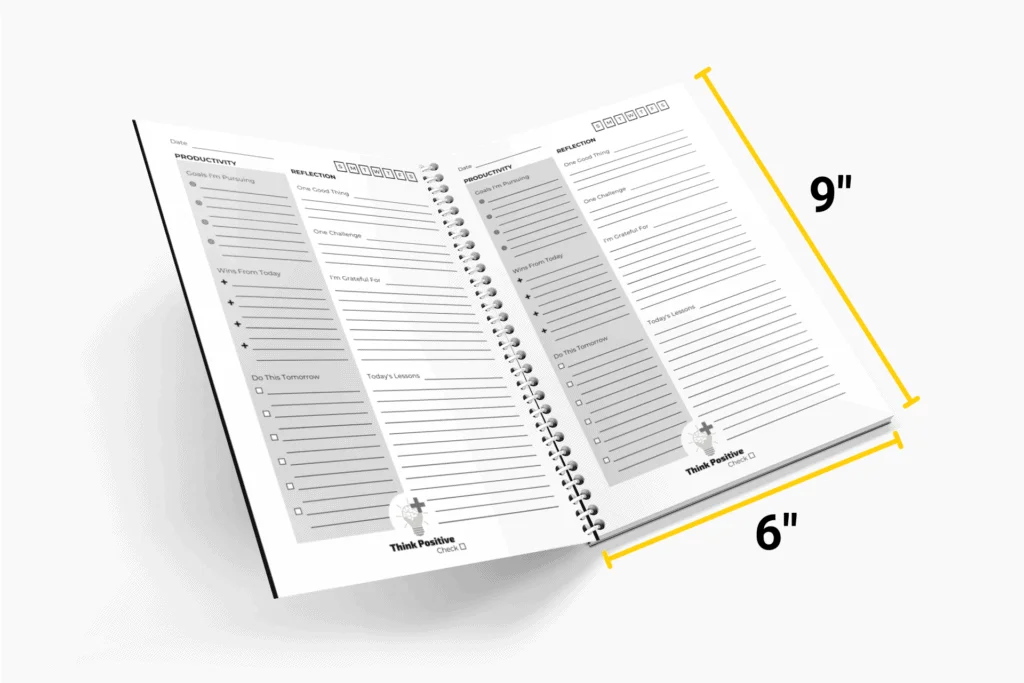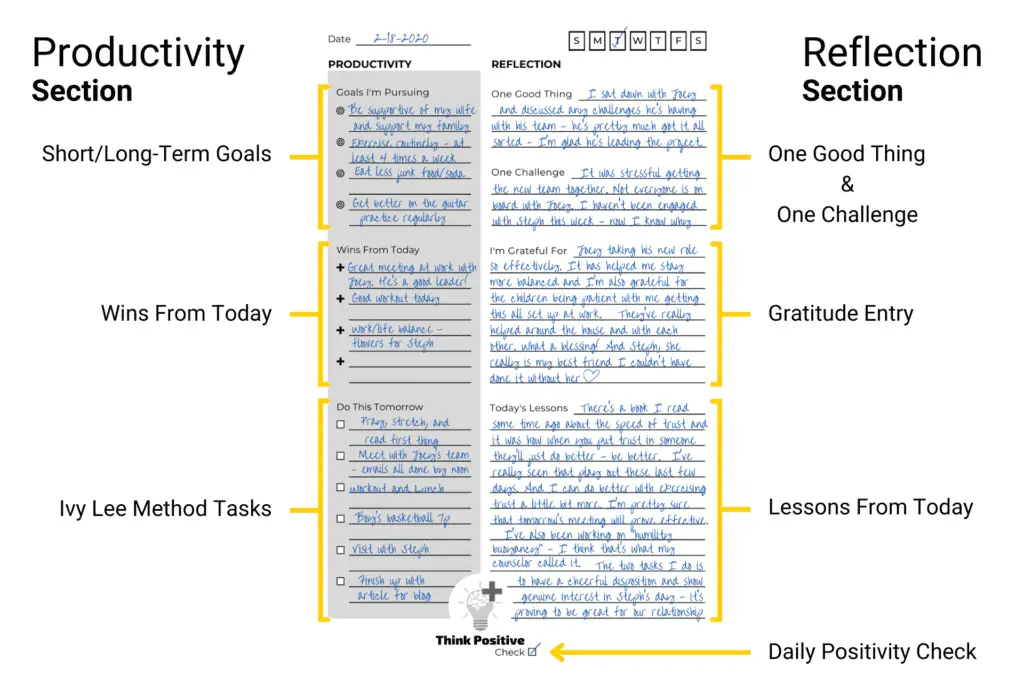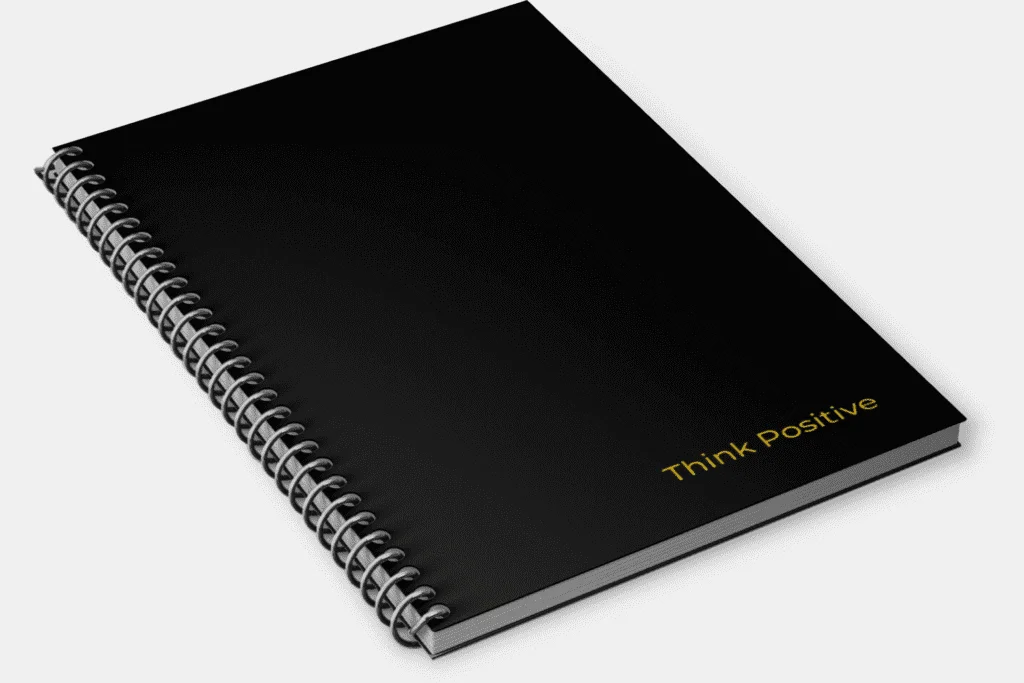The Think Positive Journal can help you achieve your goals. So why wait? Start journaling today and discover the benefits of a more positive mindset!

Simplicity is the Key
I knew journaling was good for me, even at an early age. I experienced many of the benefits, including increased self-awareness. I could regularly explore my thoughts, feelings, behaviors, and relationships with others, helping me better understand myself and others.
Writing about my thoughts and feelings was a way to release and process negative emotions, reducing stress and anxiety. Writing regularly helped me clarify my thoughts and express myself more effectively, improving my communication skills. Journaling also helped me with problem-solving; by looking at my challenges and brainstorming potential solutions, I gained clarity and insight into problems.
However, about two years ago, I realized something was missing.
That is when I discovered gratitude journals.
I can’t tell you how many different gratitude journals I went through. Although I could see the value of what one gratitude journal was attempting over another and even saw some insightful iterations, none helped me achieve the potential I hoped to obtain.
What was missing?
Catchy quotes, affirmations, helpful prompts, blank pages, “how I’m feeling” pictograms—yeah, I saw how useful all these things could be, but simplicity was needed. That was it!
I created the Think Positive Journal
I am proud to present the most straightforward positivity gratitude journal designed to help you boost productivity and focus. Unlocking your potential to achieve your goals and gain perspective from the experiences you have each day.

Here’s How It Works

Two Distinct Sections
Each section is uniquely designed to help you become more productive and focused.

Productivity on the Left
There is a strong correlation between productivity and positivity. When people feel productive and accomplished, they tend to feel more positive and confident about themselves and their abilities.
Productivity can positively impact your mental well-being, as it helps increase your sense of purpose and satisfaction. When you’re productive, you’re likely to feel more in control of your life and more capable of achieving your goals. This can lead to feelings of positivity and optimism, which can, in turn, boost your motivation and drive to accomplish even more.
That’s why I have identified three metrics that helped me be as productive as I thought I could be. I believe these three metrics will help you as well.
1 – Short and Long-term Goals
Routinely writing down your short and long-term goals is crucial for achieving success in any area of life. Here are a few reasons why:
- Helps with clarity and focus: Writing down your goals helps you to clarify your thoughts and gives you a clear focus on what you want to achieve. When you clearly understand your goals, it’s easier to identify the specific steps you need to take to achieve them.
- Increases motivation: Writing down your goals can remind you why you’re working towards something. It can help to keep you motivated when things get tough and can also help you to stay on track when you feel like giving up.
- Provides a sense of accomplishment: When you write down your goals and track your progress, you can see how far you’ve come and feel a sense of accomplishment. This can help to boost your confidence and motivate you to keep pushing towards your goals.
- Helps with time management: When you have clearly defined goals, it’s easier to prioritize your time and focus on the tasks that will help you to achieve them. This can help to prevent procrastination and ensure that you’re making progress towards your goals every day.
- Provides a sense of direction: When you have long-term goals, it’s easy to get overwhelmed by the enormity of the task ahead. Writing down your goals and breaking them down into smaller, more manageable steps can provide a sense of direction and help you stay focused on what you need to do to achieve your goals.
Writing down your short- and long-term goals is a powerful tool for success. It can help with clarity, motivation, time management, and provide a sense of direction. So, take some time to write down your goals most days, and start working towards them!
You might discover that you will often record the same goals. This is a good thing. As you re-affirm to your brain that you are pursuing a particular goal, your brain will perform its function and actively seek solutions to accomplish the goal.
2 – Wins From Today
In your TPC Journal, you want to document four things you achieved during the day. This concept originated from Dan Sullivan, who advocates teaching it to your children, if you have them, to instill the power of positive momentum at a young age.
Initially, it may seem challenging to think of four accomplishments, especially if it was just an ordinary workday. However, as you reflect on your day, you may recall positive interactions with a friend or colleague, sticking to your meal plan or workout routine, or even having a brief conversation with a loved one.
These may seem like small feats, but they are all accomplishments worth acknowledging and appreciating. Unfortunately, we have become desensitized to recognizing the small wonders and miracles that occur in our daily lives.
But it’s time to change that through positivity journaling. Jotting down these accomplishments and expressing gratitude can boost your mood and cultivate a positive mindset. With time, you may even find it challenging to limit yourself to just four items, and that’s when the positive momentum of this daily practice will truly maximize.
3 – Ivy Lee Method Tasks
Ivy Lee, a productivity consultant, created a productivity strategy in the early 1900s. It is a simple yet effective method for organizing and prioritizing daily tasks to increase productivity. The strategy involves the following steps:
- At the end of each day, write down the six most important things you need to accomplish the next day.
- Prioritize those six items in order of importance.
- The next day, start working on the first item on the list and don’t move on to the next task until the first task is completed.
- Repeat this process every workday.
The Ivy Lee Method is based on the idea that prioritizing the most important tasks and focusing on them one at a time can increase productivity and get more done in less time. The method is simple, easy to implement, and has been proven to be effective for many people.
I’ve described the most optimal way to prioritize your day to achieve the most. However, I often find myself just outlining tasks I need to accomplish. You don’t need to be perfect in how you use the TPC Positivity Journal.
Productivity is important to positivity. Being productive can help you feel more positive and motivated, while a lack of productivity can lead to negative emotions and decreased motivation. Don’t overthink it and give yourself plenty of grace.
Reflection on the Right
Spending just five minutes a day on reflection is important because it provides a space for you to process and make meaning of your experiences. Writing down thoughts and feelings can help to clarify emotions, identify patterns, and gain insights into yourself.
Gratitude journaling, in particular, has been shown to have many benefits. Intentionally focusing on what you’re grateful for can increase your positive emotions, improve your mood, and enhance your overall well-being. It can also help cultivate a sense of perspective and encourage a more optimistic outlook.
Furthermore, practicing gratitude journaling can help individuals develop a more positive and grateful mindset, leading to a greater appreciation for the present moment and the good things in life. I have included four prompts for reflection that, combined with gratitude, can be a powerful tool for personal growth and well-being.
1 – One Good Thing
Writing about one good thing can profoundly impact our mental and emotional well-being. Focusing on positive aspects of our lives can help us cultivate a more optimistic outlook and enhance our overall sense of happiness and fulfillment.
Writing about positive experiences, whether big or small, can also help us appreciate the good things in our lives and provide us with a sense of gratitude. Additionally, sharing our positive experiences with others through writing can inspire and uplift them, creating a ripple effect of positivity. Overall, writing about one good thing can be a simple yet powerful tool for improving our mental and emotional health and the well-being of those around us.
2 – One Challenge
I included this component after an experience I had. A couple of years ago, I was the adult leader of a young men’s group. The other adult leaders and I encouraged the young men to be in charge of their lessons and activities. As such, they elected one of their peers as their leader. This young man would routinely ask the other young men, “what was something good that happened to you this week, and what was something bad that happened to you?”
At first, I thought to correct this young leader and encourage him to just focus on the positive. I refrained and I am so glad that I did. What I witnessed changed my life. These young men would rally together to help one another with any challenge they faced. They would find solutions and give encouragement. It was amazing!
Writing about a challenge we’re facing is essential because it allows us to confront and acknowledge the difficulties we’re experiencing. Avoiding or denying the existence of negative experiences may temporarily alleviate discomfort, but it ultimately impedes personal growth and problem-solving.
I have learned that by writing about our challenges, we can gain clarity and insight into our thoughts and emotions, which can help us identify potential solutions and coping strategies. Additionally, sharing our struggles can create a sense of connection and empathy with others, which can help us feel less isolated and alone. Acknowledging that not everything is positive is crucial in cultivating resilience, adaptability, and well-being.
3 – Gratitude Entry
Expressing gratitude cannot be overstated. It helps us on so many levels physically, mentally, emotionally, and spiritually. Taking a moment to reflect on something we’re grateful for is so important.
Here are some of the key benefits of gratitude journaling:
- Increases positive emotions: Gratitude journaling helps you focus on the good things in your life, which can increase positive emotions such as joy, contentment, and happiness.
- Reduces stress and anxiety: Gratitude journaling can help reduce stress and anxiety by shifting your focus away from negative thoughts and worries.
- Improves sleep: Practicing gratitude before bedtime has been shown to improve the quality of sleep, which can lead to better health and well-being.
- Strengthens relationships: Expressing gratitude towards others can strengthen relationships and foster a sense of connection and belonging.
- Increases resilience: Gratitude journaling can help you develop resilience by reframing challenges and setbacks as opportunities for growth and learning.
To get started with gratitude journaling, set aside a few minutes each day to write down a few things you are grateful for. It can be as simple as appreciating a good meal or a beautiful sunset, or something more meaningful like the support of a loved one or a personal accomplishment. Over time, this practice can help you develop a more positive and grateful outlook on life.
4 – Lessons From Today
This final prompt can be used just to record the events and experiences of your day. However, I have framed it as the lessons of the day. You are free to use this prompt however you’d like, but consider reflecting on what lessons you gained.
There are several reasons why it can be beneficial to record the lessons we learn each day:
- Reflection: Recording the lessons learned from the day can help us reflect on our experiences and identify patterns in our behavior, thoughts, and emotions. This can help us gain insight into our strengths and weaknesses and make positive changes in our lives.
- Memory retention: Writing down the lessons we learned can help us remember them more easily, as we are actively processing the information and engaging our brains differently than simply thinking about it.
- Accountability: Keeping a record of our lessons learned can help us hold ourselves accountable for making progress toward our goals and learning from our mistakes.
- Growth: By recording the lessons we learned, we can track our personal growth over time and see how we have developed and changed as individuals.
Recording the lessons we learn from each day can help us become more self-aware, improve our memory retention, hold ourselves accountable, and track our personal growth.
Daily Positivity Check
As a bonus, I have included a simple box at the bottom of each page to check off when you exercise positivity.
I use it just to reflect how well I remembered to be positive. Like remembering to get ready, put on pants, and to think positive – check. That’s why I named this blog what I did. Each day I choose to think positive! Check!

